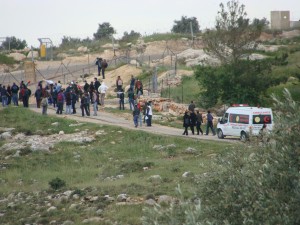 Zeek, April 20, 2010
Zeek, April 20, 2010
The Huffington Post, April 20, 2010
The gag on the case of Anat Kamm, the former soldier who leaked classified military documents to Haaretz journalist Uri Blau, was lifted less than two weeks ago. Already the story is slipping from the radar. But the real issue at hand never got screen time.
Kamm’s story points towards it. So does Blau’s 2008 Haaretz article—which he wrote using documents provided by Kamm. The story detailed the 2007 assassinations of two Palestinian militants, killed by the IDF in the West Bank despite a 2006 Israeli Supreme Court ruling that outlawed such hits.
This is but one example of a state that consistently behaves as though its own Supreme Court doesn’t exist.
In 2007, the Israeli Supreme Court ruled that a portion of the separation barrier that runs through the West Bank village of Bilin must be moved. “We were not convinced that it is necessary for security-military reasons to retain the current route that passes on Bilin’s lands,” Dorit Beinisch, President of the Supreme Court, stated in the decision. The ruling meant that some 250 acres of land would be returned to Palestinian villagers.
To this day, almost three years after the ruling, the barbed-wire fence remains in place. Farmers still cannot reach their land. Severed from their olive groves, they cannot make a living.
In 2006, the same court struck down the binding arrangement, a governmental policy that links the legal status of migrant laborers in certain fields directly to their employers. This arrangement essentially allows employers to cancel visas on a whim, granting them an excessive amount of power over workers. Justice Mishael Cheshin, one of the three who ruled unanimously against the policy, likened it to a “modern form of slavery.” He wrote, “The binding arrangement… allows the state to bind the hands and feet [of migrant laborers] with cuffs and chains to an employer who ‘imported’ them to the country.”
Two years after this ruling, the flying visa, a scam that has robbed foreign workers of thousands of dollars, surfaced. It operates on the binding arrangement. A worker pays a large sum of money to an Israeli agency in his home country, is linked to an employer here, gets the visa, and flies to Israel. But when he arrives, his job is cancelled—and so is his legal status. The agency keeps his money and brings another worker who, like the first, has taken loans to pay the exorbitant fees.
Illegal, in debt, the worker takes whatever off-the-books job he can. Afraid of being caught by police and thrown to his home country, he can’t complain about wages or abuses. That is, if he can find employment. That is, if he’s not deported. Human rights organizations have received unconfirmed reports that some flying visa victims have committed suicide after returning home empty-handed.
To this day, over four years after the judgment, the state remains in contempt of the Supreme Court’s ruling. The binding arrangement and flying visas continue.
And what little conversation is left about Kamm is, sadly, centered on the details of her detainment.
“Police raid Anat Kamm’s house after unauthorized visit by relative” was a headline in yesterday’s Haaretz. It seems that, once again, the Israeli media is missing the point. It’s not about Kamm, it’s not about Blau. It’s about a state, out of control, that tramples on human rights and doesn’t answer to the judges it has appointed.
A democracy includes a government that is kept in check by the rule of law and the bodies that enforce it, such as the judicial system. A totalitarian regime does not. As Israel ignores one Supreme Court ruling after another we have to ask ourselves, where are we headed?
The Jewish people are falling prey to something akin to the flying visa scam. We bought into a promise of democracy. We came here, hope in hand. Now, with the state bypassing the judicial system, our democracy is being undermined. And so is our legitimacy as a law-abiding nation.
I’m writing this from Jerusalem, on Israel’s Independence Day. As I made the trip from Tel Aviv, sitting in the back of a sherut, I passed the separation barrier. I stared at the cement walls, the olive trees struggling in its shadow. I thought of Bilin, the fence that slices the village in two.
And then we flew through another checkpoint and we were out. The road was flanked with blue and white flags. Maybe we’ve returned home, I thought. But we’re standing in the doorway empty-handed.
*Protest at Bilin’s separation barrier